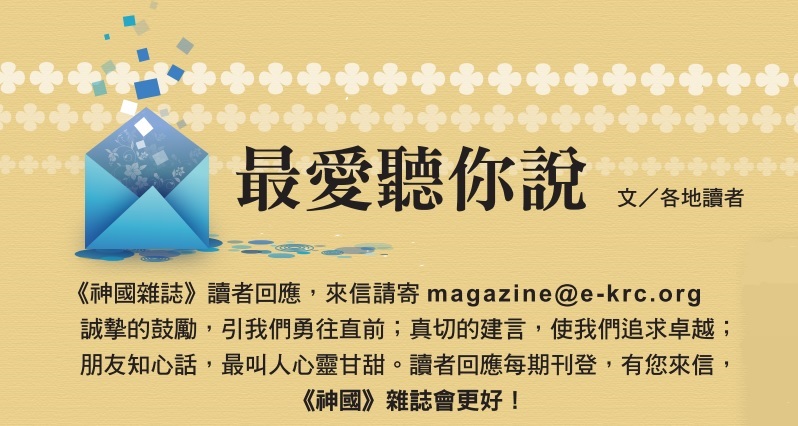【I love listening to you most】
Responses from readers of Kingdom of God Magazine

Restart, reset or upgrade?
As a long-term reader of "Kingdom of God" magazine, I especially like the relationship section of "Knowing and Doing in Kingdom of God", especially the column "Relationships in the Screen Mirror" written by Li Wenping. I guess the author used "screen mirror" as a pun for "calm"? Or, a clear "screen mirror" can better reflect the various aspects of the relationship.
When it comes to relationships, the problems are often entangled and complicated, especially family relationships, which seem to have so many threads that it is difficult for an upright official to resolve them. The author uses "Restart, Reset or Upgrade" as the title, using the computer system as a metaphor for the relationship, like restarting or resetting a computer. The author gives examples to let readers know what is possible.
When it comes to handling and improving relationships, the most fundamental way is to upgrade, which means changing your attitudes, thoughts and concepts.
Even if you are a Bible-reading Christian, you may have blind spots that you are not aware of, which can affect your relationships or damage your spiritual life. The author reminds us to practice awareness to discover problems. Once we are aware, we can use "activate or reset" to "upgrade" our way of thinking, mentality, and operating mode. This is really good advice.
(Taiwan‧Pingtung‧Chen Jialing)
Soteriology Orientation Daily
65期溫永勖牧師的【神學新日常】系列l〈新冠是現代世界的終結者?再思救恩論〉一文,引我深思,也期待作者未來的教會論和人論。
Along with the desire for the post-epidemic era, there are doubts and anxiety about whether we can return to "normal". The author focuses on three doctrines that deserve to be deconstructed and then reconstructed, to gain a clearer understanding of beliefs and practices, and to respond to the "new daily life" after the epidemic with "healthy truth" theology and soteriology.
Practical and full union with Christ, participation in God's ongoing "redemption" of our lives and the world, is the foundation of soteriology. Interpreting "salvation" from the perspective of redemption highlights the root cause of sin in "broken relationships." The Trinity is a connected relationship. Salvation includes four levels: the redemption of the relationship between God and man, man and man, man and himself, and man and all creation.
Being isolated at home due to COVID-19, I had more quiet time to deepen my relationship with God, and found that I had new perspectives. The author emphasizes that as God’s children, we live in a four-level redemptive relationship and can welcome the “living hope” of God’s kingdom in the “new daily life.” This gave me a clearer understanding and reduced my concerns about the consequences of the post-epidemic era. Anxiety of change.
(Wang Shufei, Michigan, USA)
Invite Jesus into my work
讀了《神國》65期〈Light, shine in front of people〉,給我很多啟發,尤其是「進入職場的國度」一段。
I believe many people see the workplace as a channel for self-certification. From a spiritual perspective, work should be a calling, and the workplace is a field where God uses us. I often think, can’t “self-certification” also be an inspiring testimony? Does “self-certification” count as a calling from God? With time and various changes, I realized that letting God intervene and become His instrument, the results are often beyond imagination.
The most impressive thing in the article is "I will put an empty chair in the office to remind myself to invite Jesus into my work." Even in the workplace, the great God is still present, and the Holy Spirit continues to work in life; no matter what you deal with, always look to God and no longer do it for achievement, money, or vanity.
This article broadened my horizons and made me realize that faith can be a solid foundation in the storms of the workplace. Prayer is no longer limited to one's own performance, but more and more management of the "harvest field" given by God from a spiritual perspective.
(Taiwan‧Taipei‧Zhou Ziling)
